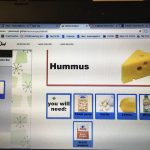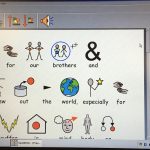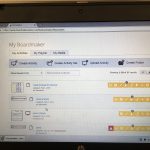To enhance our Special Education K-coded programming with the use of smart technology, smart applications and assistive special education (SEA – Special Education Allotment) computer programs.
To build capacity within our Teacher Learning Community Team in various areas of assistive technology, program use and applications suited to the classroom. To enhance our current learning environment through learning, creating resources and using technology like Boardmaker, SymWriter, SMART Board Activities, and Google Read&Write, as well as using iPad applications and videos to increase capacity and purposeful student use of these in the classroom.
Sharing the existence of specialized programming geared for students with Autism Spectrum Disorder and other specialized programs (LEXIA and TeachTown) that offer differentiated instruction that will benefit all of our students.
Our TLC team collaboratively continues to share our knowledge and applied use of technology in different areas to be used by students and supported by Educational Assistants.
Team Members
Nancy Cabral
London District Catholic School Board
Cristina Ferreira
London District Catholic School Board
Elizabeth Jenkins
London District Catholic School Board
Professional Learning Goals
We were able to create visual schedules and social stories effectively by using programs such as Boardmaker and Symwriter.
We shared our knowledge and became familiar with various new and unknown applications that met our students’ numeracy, literacy, sensory, social and emotional needs.
Used the iPad (photos and videos) for assessment purposes. Many students with developmental challenges demonstrated their knowledge using manipulatives and learning tools (e.g., a video clip of a student demonstrating the use of an adaptive can opener).
Learned how to use and implement board-issued SEA computer programs to enhance the purposeful and meaningful student use of these professionally recommended programs (e.g., text-to-speech and speech-to-text programs).
Activities and Resources
- Built and shared knowledge of the programs, increased familiarity of assistive technology to encourage staff and student use and implementation of these programs
- Built knowledge in the area of recommended SEA computer program and iPad apps, as well as other daily living apps
- Used YouTube videos for training on Google Read&Write, Boardmaker, Your Special Chef Recipe creator and Smart Exchange for SMART Board
Unexpected Challenges
- Wi-Fi unavailable on occasion
- Co-ordinating between member schedules and teaching locations
- Scheduling our Professional Development sessions with the limited time span for executing this project
Enhancing Student Learning and Development
By enhancing our own knowledge, familiarity and confidence in using computer programs and applications we have been able to educate colleagues and support students to meet their independent learning goals. In this short time span, we have seen independent student use of applications shared through this TLC initiative and more effective teacher-led use of technology.
Sharing
We have shared our knowledge of specific programs with other School to Community Pathway teachers and Student Program Support Teachers, as well as Educational Assistants through short in-school Professional Development sessions.
Project Evaluation
Our Teacher Learning Community Team is now far more confident in our use of technology and training both staff and students in the use of specific programs.
The release time has provided us with an opportunity to share our own knowledge with other colleagues teaching in Special Education programs. It has given us time to discuss, create, brainstorm and share best practices in Special Education.
The TLC project has provided our TLC team with the funds to purchase mobile technology (iPads) as well as apps for our own Professional Development and to support and meet students learning needs.
Resources Used
Read&Write for Google Chrome Quick Reference Card
Boardmaker Help & Training Centre
Get to Know Your SMART Board – YouTube video
Resources Created
These resources will open in your browser in a new tab, or be downloaded to your computer.




